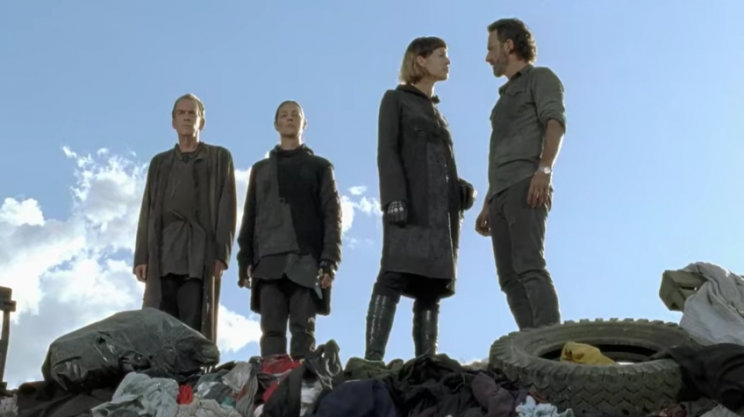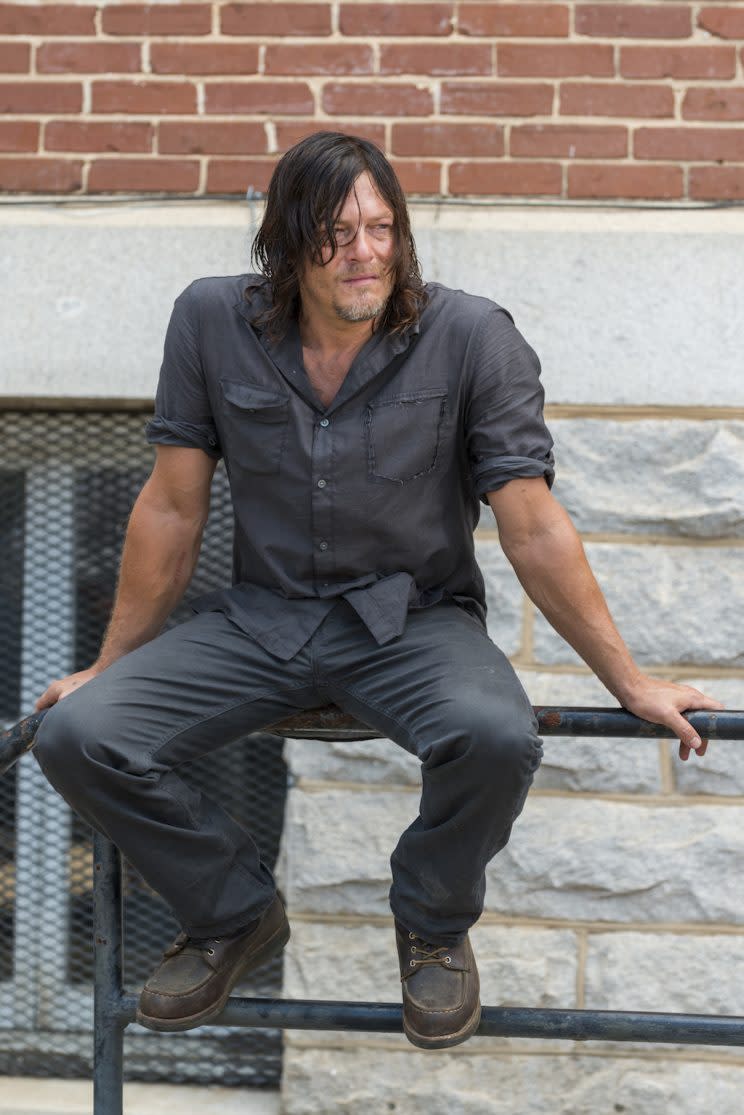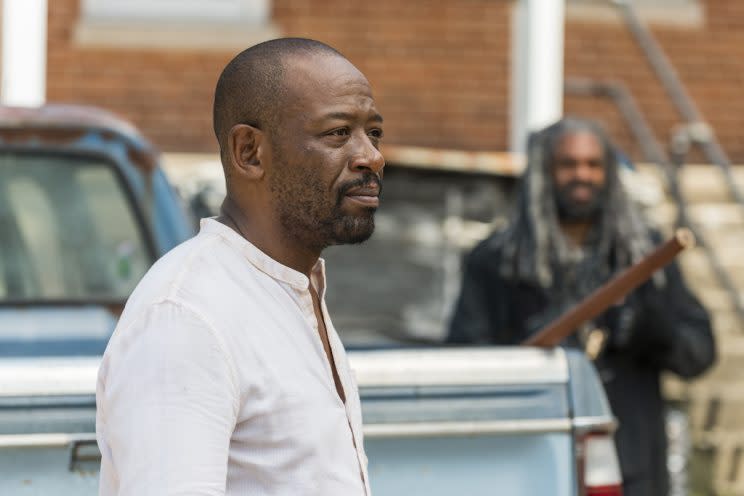‘The Walking Dead’ Postmortem: Scott Gimple on the Junkyard Group, Daryl's Deception and More

Warning: This interview for the “New Best Friends” episode of The Walking Dead contains spoilers.
New allies for Alexandria, a special reunion between Daryl and Carol, more Jerry, cobbler, that spiky walker named Winslow, and more proof of the importance of Richonne… “New Best Friends” packed a lot of storyline into one episode, and most of it continued the new feeling of hopefulness that Rick and the Alexandrians have started to feel for their future.
The Walking Dead showrunner Scott Gimple talked to Yahoo TV about the new bonds formed, the continuing conflicts — outside and internal —that are holding up Rick’s big-picture plan for a war against the Saviors, and gave some hints about the mystery of that as yet unnamed group of survivors who live at the junkyard. Gimple also broke down exactly what motivated Daryl’s decision to spare Carol the news about Glenn and Abraham, and told us about how our new favorite TV sidekick — Jerry, of course — came to be.
Both of these first two episodes of the second half of Season 7 have made for a fun way to rejoin Rick and company.
It is lovely to hear. Everybody has earned a little bit of fun. We all had to go through a pretty difficult journey, but that’s part of a story.
Absolutely, especially with all these lighter moments. And Jerry!
I love how much people love Jerry. In many ways, [the character] started just when Cooper [Andrews] started coming in to audition for stuff. I was just like, “We’ve got to use him at some point.” In the [comic book], Ezekiel’s this amazing, huge character, but we didn’t see so many people from around the Kingdom. It just seemed that Ezekiel had to have a foil of sorts, and also he needed somebody who makes him look even more kingly to have this unbelievably badass looking guy [with him]. It just so happens that he is this unbelievably sweet guy, which kind of punctures the fantasy in moments sometimes.
It really does all work together though. Greg Nicotero said one of the things you all really recognized and loved about him, and what helped bring about the character’s personality was Cooper’s smile.
He’s this gigantic guy who knows weapons — in real life, too — very well. Yet he doesn’t scare me. He makes you happy as soon as he opens his mouth. The Kingdom, at least Ezekiel, is so much about acting a part, and Jerry visually acts the part. He’s not as good an actor as Ezekiel. I’m not talking about Cooper. I’m talking about Jerry.
And then there’s Richard, Ezekiel’s trusted advisor, who agrees with Rick, and who has made some points no one else has — especially about the urgency of trying to take on the Saviors. Richard is right in thinking that it probably is going to take something personal to make Ezekiel change his mind, if his mind can be changed.
Absolutely, yeah. It’s about the people for Ezekiel. Maybe it takes the people being threatened. Maybe it takes a loss to move him into it. I think it does speak to Daryl’s state of mind and where he’s at, that he seemed to be going along with it until the point that [he learned] it was Carol [who would have to die], which is a pretty big thing. It really does reflect that Daryl’s not quite the person he used to be. I think what happened in [“Hearts Still Beating”] with portly Joey… he didn’t have to kill Fat Joey. He could have escaped. Who knows? Maybe Joey would have somehow in that moment betrayed him or compromised his escape, but it didn’t look like he needed to do that, and yet he did that. That’s a very different thing for Daryl. That isn’t who he was. He is very much affected by what happened to him in the Sanctuary, how he was treated and, of course, losing the people that he’s lost in the way that he lost them.

Is he also motivated out of guilt over the skirmish that happened that was followed by Glenn’s death?
Absolutely. I feel a little funny saying that out loud, because that will be served, but I think we’ve shown that on the show. I think in [“The Cell”] we showed the guilt side of it with the [Polaroid]. He’s carrying a great deal of guilt. He didn’t know what would happen, and I don’t think it really is his fault, but it feels that way to him.
We have that great reunion between Daryl and Carol, and you’re thinking, “He’s going to have to be the one to tell her what’s happened to Glenn and Abraham,” and he chooses not to. What was his main motivation in deciding to keep that from Carol?
It was unselfish. It doesn’t follow what he really wants. At the beginning of the episode he said, if she knew what happened to Glenn and Abraham, she’d be leading the way to the Sanctuary. He doesn’t tell her because he knows that she doesn’t want to get swallowed up in the violence. She doesn’t want to lose herself. That’s why she had to get away, which is what she says. She says it a lot better than I just did. It’s unselfish because he sees that she left because she had to, and that this would draw her back. He both spares her joining up, but he also spares her in a way that she can preserve something else… He allows her her solitude, which he doesn’t want for her or himself. He’d like to have her back. It’s an incredibly unselfish thing that he does, what I hope that the audience even sees is heroic in some ways.
Related: The Most Romantic (And Bromantic) Moments Ever on ‘The Walking Dead’
Morgan says to him later that he knows there’s something Daryl’s trying to maintain by the fact that he didn’t tell her. Is that that Daryl at some level wants to maintain his humanity, and not just for himself, but for his friend, Carol?
That’s absolutely it. However hard he’s trying to be, however cold he’s trying to be, however heartless he’s trying to be, he’s still a person. That’s something that I feel has always been present in that character from the moment Norman walked on the screen, and I think the thing that makes Daryl such a fascinating character is, however believable he is as somebody who can be straight dark and scary, there’s always that flicker of humanity. There’s always that presence of a human being with an emotional life that very much starts with Norman Reedus and the way he portrays the character. It’s something that, however much Daryl tries to extinguish in the character, it looks like he can’t… or can he? We’ll find out.
When I talked to Andy Lincoln about the midseason premiere, his preview of this episode was that it was going to be “bananas.” I think the minute you see Winslow, you know exactly what he meant by that. First of all, what should we call this group?
Eventually, the characters call them scavengers. We started calling them that. They had nicknames on set. There were nicknames, I think, on the Internet before. I can spoil a pretty mundane fact that they start calling them scavengers, because that’s what they are. They are scavengers, and they aren’t talking about them with a capital “S,” necessarily, but it is what rolled off the tongue because they scavenge.
I think “Garbage Pail Kids” has been the most popular nickname on the Interwebs.
I believe that’s trademarked, so I can neither confirm nor condone that. Yes, they live in a place called the Heaps. On the set they were calling them the Heapsters.
The whole meet-up with them, the junkyard crew, whatever we want to call them, it has at first a very otherworldly, Star Trek “Amok Time”-meets Mad Max vibe to it. The more we hear Jadis talk, the more we learn about this group, it seems like they may have existed as a very different group even pre-apocalypse. Have they been together longer than the apocalypse?
I would say there’s a great deal of mystery with them. Even the way they speak, they give up as little as possible. They use the absolute minimum number of words they need. Do they talk that way to each other? Maybe. They don’t give out anything, because why should they?
Though I know definitive answers to some of the questions you asked, I would hate to say precisely what they are, because they live in a mystery. Maybe some of those questions will be answered, and maybe they won’t. I love hearing some of the theory that you just mentioned. I’m interested in other people’s theories as well. They very much have a little organized society there. I shouldn’t say another word about it. I’ll spill it all.
It is a good thing that Michonne is there to point out to Rick that he should use the garbage walls to take Winslow down and keep him down. It’s another instance of Rick and Michonne working together to this great result.
Yes, and it’s so important even for the first half. It is very, very much intended that Michonne was a huge part of Rick being able to get to the place where he could picture fighting the Saviors. What Michonne said to Rick is the only way they could do this is together. Yes, the portholes in the [garbage] pit enables Michonne to be there. Why do they have portholes in that pit? Because they have that pit for a reason, but we won’t talk about the reason. I’m glad you noticed that. That’s super cool.
This introduction of the scavengers also furthers the storyline with Gabriel, and the friendship between Gabriel and Rick. I love that Gabriel plays a huge role in convincing Jadis to listen to Rick and to what they’re proposing. And in the end, Rick gives him a lot of the credit for making Rick more open to trusting new people, taking a chance on new people.
They’re two people who have come to mean a lot to one another and yet their first meeting was not so hot… that’s been a momentum for Rick. That was what he learned with being in Alexandria, like, “Oh boy, these people don’t get it,” to looking at it as a community and then pooling their strength together. Gabriel’s a big part of that, and now it’s looking like Rick’s only hope is to do this with very, very different people, who he also had a bad initial meeting with.

Looking to the rest of the season, Morgan continues to be at odds with his friends, with himself even, about going to war against the Saviors. He didn’t want to kill, but he had to in self-defense and defense of Carol. Given that he did kill someone, why is it still so tough for him to not be able to see the big picture with the Saviors and realize they really are in a self-defense place with them, too?
What he put forth was, maybe it isn’t just about going right to war. Maybe it’s just about holding Negan. He’s still hopeful to find other solutions, which is more than where Ezekiel is, but it’s less than where Rick is. It really is a question of, Morgan knows that killing brought him to trauma. He can kill. We’ve seen him kill and be quite efficient at it. To open up that door for himself, even for others, to be involved in killing and killing and killing and killing, that isn’t what human beings were put on earth for, he believes, and it takes something away from them.
He is very conflicted. I’m sure there’s a part of him that’s like, “You know what? I wish I could just put my head down and be a soldier, be of service to Rick and sort this out in the ugly way that it probably needs to get sorted out,” but he also knows himself. He’s unsure whether he will be able to take it.
When [Lennie James] plays it, we try to not give it too much dialogue, because he’s conflicted about both sides. He doesn’t speak his mind about the avoidance of killing with this ultra-confidence, but it’s the only way he sees going forward. There’s no pride there. There’s hope. There’s even a little bit of shame. It’s a very human and a very vulnerable thing. It’s an incredible tribute to Lennie’s unspeakable talent — which I am speaking about.
The Walking Dead airs Sundays at 9 p.m. on AMC.


